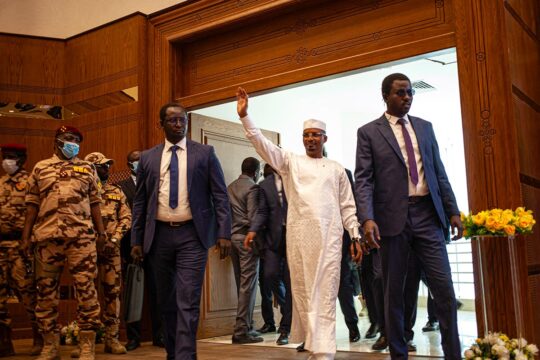A desert warfare specialist, Chad's Hissene Habre seized power in 1982 and quickly embraced the role of ruthless dictator, with brutal atrocities the hallmark of his eight-year reign of terror.
Often dressed in combat fatigues that complemented his "desert fighter" nickname, Habre fled to Senegal after he was ousted by Chad's current President Idriss Deby in 1990.
On Monday his court-appointed lawyers began an appeal seeking to overturn his life sentence for war crimes, crimes against humanity and a litany of other charges handed down in May last year.
In July, Habre was further ordered to pay up to 30,000 euros ($33,000) to each victim who suffered rape, arbitrary detention and imprisonment during his rule, as well as to their relatives.
The 74-year-old's rule was marked by fierce crackdowns on dissent, including alleged torture and executions of opponents, earning him comparisons to Chilean dictator Augusto Pinochet.
Investigators found that more than 40,000 people were killed during his rule.
The son of a farmer, Habre was born in Faya-Largeau, northern Chad, and grew up among nomads in the Djourab desert.
His intelligence landed him a job as a local official before he left for Paris in 1963 to study law and attend Sciences-Po, the prestigious political science school. One of his influences at the time was Ernesto "Che" Guevara.
Habre joined the Chad National Liberation Front a year after returning home in 1971 and became its leader, before breaking away to form another rebel group, the Northern Armed Forces (FAN).
He made headlines in 1974 when he kidnapped a French ethnologist who was held for three years before France agreed to terms for her release.
A staunch nationalist, Habre then served as prime minister in the government of president Felix Malloum and as defence minister under his sometime ally Goukouni Weddeye who later became president.
Unlike Weddeye, Habre was an outspoken opponent of Libyan leader Moamer Kadhafi and the relationship did not last.
Habre broke from his Tripoli-backed ally just months after the formation of Weddeye's 1979 government, triggering violence in Chad's capital, N'Djamena.
He fled the city for eastern Chad in 1980, but returned to fight his way to power in 1982.
- 'Emptying the coffers' -
During his rule, opponents -- real or imagined -- were arrested, tortured and often executed by the dreaded Documentation and Security Directorate (DDS), Chad's secret police.
Habre's reign ended as dramatically as it had begun when Deby, a formerly loyal general, led a rebel force that drove him from power and into exile in Senegal.
The former dictator lived freely for more than 20 years in an upmarket Dakar suburb with his wife and children, swapping his military garb for billowing white robes and a cap.
He was considered a discreet, generous neighbour and a pious Muslim who helped finance the construction of several mosques.
US lawyer Reed Brody, who investigated Habre's regime for Human Rights Watch, said the ex-dictator took the precaution of "emptying the coffers" before leaving Chad and built up a "protection network" in Senegal.
"The appeals court now needs to make sure that a system is put in place so that Habre's assets can be located, seized and transferred to his victims to compensate them for what they have suffered," Brody said ahead of the appeal.
In his 2014 memoirs, then-president Abdou Diouf said it was a battle to convince Habre to return the Chadian state-owned plane that had flown him to Dakar.
The African Union (AU) mandated Senegal to try Habre in July 2006, but President Abdoulaye Wade delayed the process for years despite an agreement to create a special court for the trial.
Belgium also sought his arrest over allegations of war crimes and crimes against humanity after three Belgian nationals of Chadian origin filed a suit in 2000 for mass murder, arbitrary arrest and torture during his regime.
Brussels issued an arrest warrant for him in September 2005, and he was arrested in Senegal shortly after, but the African country said its courts did not have the jurisdiction to rule on a Belgian extradition request.
Habre was arrested again in Dakar on June 30, 2013 and the AU decided his trial should take place there, making Habre the first African leader accused of atrocities to face justice in another African country rather than in an international court.
burs-jom/ach





